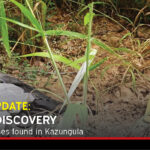In his nine years at Puma Energy, Dominic Dhanah’s journey with the fuel supplier has taken him across Africa, serving in leadership positions in Namibia, Malawi and Tanzania.
Two years ago, the engineer’s Puma profile entered an exciting new chapter, as he took up the role of Managing Director (MD) at Puma Energy Botswana.
Describing himself as a ‘business engineer’, the brainy boss holds a degree in Mechanical Engineering from the University of Zimbabwe, as well as an Executive Master of Business Administration in Innovation and Entrepreneurship from HEC Paris.
Today, he leads 44 retail sites and serves four airports and airfields within BW.
Now, Dhanah finds himself flying onto Voice Money’s hallowed pages…
Kindly introduce yourself?
I am an engineer by profession, with a strong passion for building and empowering successful teams that thrive independently.
Throughout my career in the oil industry, I have had the honour of working with exceptional managers who have significantly influenced my growth.
I feel it is my duty to guide the upcoming generation of outstanding leaders.
Can you provide an overview of Puma Energy’s operations?
Puma Energy is a leading global energy business, safely providing energy across six continents.
Our downstream business segments include: fuels, clean & low-carbon energy, aviation, lubricants, LPG and bitumen.
We have 1, 979 retail sites with 676 in Africa and serve 117 airports and airfields globally, 91 of them in Africa.
What key initiatives are Puma Energy currently involved in, and how do they align with the company’s long-term strategic goals?
Long-term Puma Energy is focused on diversifying its fuel offerings like investing in solar options.
We are implementing digital solutions to enhance operational efficiency, supply chain management and customer engagement, and we’re expanding our African presence.
Puma Energy is committed to energising Africa’s growth, delivering safe, reliable and affordable downstream energy solutions across the continent by strengthening our network and partnerships in key markets.
We want to empower Africa’s downstream energy future and ensure that Puma Energy is a Pan-African energy partner committed to growth, transformation and sustainability of the downstream energy sector whilst addressing socio-economic issues across Africa.
And in Botswana?
Within Botswana, Project Maatlafatsa has become a key aspect of our business.
We believe that empowering citizens is crucial to building a prosperous and sustainable future for the energy sector in Botswana.
How does Puma Energy differentiate itself from other energy companies in the market?
Through Project Maatlafatsa, Puma Energy Botswana is playing a meaningful role in empowering citizens, in partnership with the Government and our stakeholders, and to driving sustainable change within the fuel sector This, along with our continued investment in health and safety, our investment in digital solutions to streamline our operations and enhance our customers’ experience, our focus on diversifying our fuel offering and introducing solar solutions, our commitment to ‘energising communities’ – bringing energy solutions to where people need them while simultaneously creating jobs and building skills, set us apart.
What factors do you believe contribute to the company’s success and growth?
There are several factors that contribute to Puma Energy’s growth and success.
We deliver on our purpose to supply fuels to power transport by land, sea and air to connect people and businesses across 37 countries.
We provide access to energy through nearly 2, 000 stations to improve livelihoods and enable prosperity.
We deliver energy solutions to help companies improve their performance and achieve their goals.
And we are moving into lower carbon and renewable energy that creates opportunities and secures the future of our communities.
How has the company adapted to changes in the energy industry, such as shifts towards renewable energy sources and increased focus on environmental responsibility?
In 2023 we believe we made good progress in advancing our ESG strategy aimed at ensuring the long-term sustainability of the business and supporting our purpose of ‘energising communities’.
As an energy company, we recognise the important dual role we play in reliably and safely supplying energy to support socio-economic development, whilst also helping enable the energy transition and advocating for environmental stewardship.
In all our activities, we seek to: reduce our environmental footprint; increase the skills, capacity and wellbeing of our staff; be productive members of our communities; support an equitable and just energy transition.
We continue to integrate best practices and build on our ESG ambitions while informing our approach in line with evolving stakeholder expectations and guidelines.
In 2023, Puma maintained its (A-) score from the CDP Climate Change questionnaire.
How does Puma Energy ensure the safety and reliability of its energy products and services?
Safety is more than a priority in our operations: it’s a core value that is an integral part of our business!
We are committed to safeguarding the security and health of not only our employees but all our stakeholders that interact with our operations.
We monitor and actively manage our Health, Safety, Environment and Community risk.
One of our major risks is fire in our terminals, which we seek to mitigate by implementing regular operational controls, and by installing effective fire fighting systems.
We work with transporters to improve their own HSEC performance and encourage them to train their drivers properly, control driving hours and educate drivers on fatigue management.
We provide and mandate the use of Personal Protective Equipment (PPE).
We train our employees in line with the highest international standards and actively promote a high safety awareness culture.
What challenges has Puma Energy faced in the global energy market?
Puma Energy has faced several challenges in the global energy market, particularly in sub-Saharan Africa.
One of the major challenges is the infrastructure investment gap, which threatens energy security and economic progress in the region.
The company has identified bottlenecks and constraints in the liquid fuel supply chain, including inadequate storage capacity, congested ports, and limited pipeline infrastructure.
How has the company navigated these challenges to maintain its competitive edge?
To address these challenges, Puma Energy has developed strategies to improve supply chain efficiency and reduce costs.
For instance, investing in pipeline infrastructure is expected to save significant US dollars in potential savings across key supply corridors analysed.
Additionally, the company aims to reduce operational greenhouse gas emissions and contribute to the adoption of low-carbon and renewable energy solutions.
What is Puma Energy’s take on this 90 percent import quota mandate by the government of Botswana?
As a responsible corporate citizen in Botswana, we have a role to play to support government initiatives.
Our commitment to the nation involves empowering citizens to create a sustainable future for the energy sector in Botswana.
Puma Energy sources fuel products in accordance with regulations, including from companies owned by citizens.
We are actively engaging with stakeholders including government and regulators to bolster fuel security for the country.
Can you share any recent partnerships, acquisitions, or expansions that Puma Energy has undertaken to strengthen its position in the energy market and expand its reach?
The most significant initiative in Botswana is Puma Energy’s commitment to expanding Batswana ownership.
Additionally, Puma Energy is actively working with citizen enterprises to diversify its services for customers, create more job opportunities for citizens, and bolster citizen empowerment.
Recently, Puma Energy Botswana transferred all its internal transportation services from its storage facilities to its sites to citizen transporters, evidence of its commitment to supporting local businesses.
How does Puma Energy engage with local communities and stakeholders in the regions where it operates, and what efforts does the company make to contribute to the development and well-being of these communities?
In Botswana Puma Energy through Project Maatlafatsa expands on our purpose of ‘energising communities’.
It aims to unlock the potential of our customers, foster economic growth, social transformation and environmental sustainability in the energy sector in Botswana, creating value for our stakeholders as we support the nation’s ambitions towards empowering local citizens.
Across several of our markets in Africa, including Botswana, among our community programmes is a road safety education programme that targets primary school children, the most vulnerable road users, to teach them skills that will enable them to become responsible road users.
The ‘Be Road Safe Africa’ campaign aligns with Puma Energy’s longstanding initiative ‘Be Puma Safe,’ which aims to promote responsible driving habits and create a secure environment for all road users.
What advice or insights would you share with other leaders in the energy sector based?
Embrace innovation, foster strategic partnerships, prioritize customer centricity, and invest in talent development.












